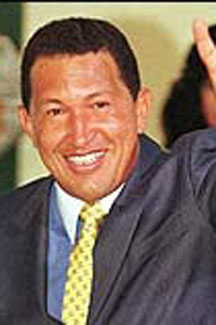CARACAS, (Reuters) – Venezuelan President Hugo Chavez hosts a regional summit this week that puts his recovery from cancer at center stage as he begins his toughest election campaign yet.

The first meeting of the 33-member Community of Latin American and Caribbean States (CELAC) on Dec. 2-3 was originally meant to be held six months ago to coincide with the 200th anniversary of Venezuela’s independence.
But it was called off at the last minute as Chavez recovered in Cuba after surgery to remove a large tumor.
Back home and back to his old self in many ways, he has reveled in preparations for a group that he hopes will be an alternative to the Organization of American States (OAS) and pointedly does not include the United States or Canada.
“A new organism will be born. This is truly historic,” the socialist leader said in a lengthy televised cabinet meeting.
“How many years have we been in this battle? It’s a first step, not the victory. The fight began in 1820 after 300 years of conquest, domination and genocide by European empires.”
He has been following doctors’ orders to reduce his public appearances and cut back on his famously workaholic schedule, so friends and foes alike at the gathering will be looking out for any clues to his health.
“This is the first time he’s parading in front of all his regional peers since the cancer. He will want to look good on the big stage as always,” said one senior Western diplomat.
“Despite all the rumors going around, I’m actually amazed at how much energy he seems to have. He doesn’t look like a man who’s dying to me.”
Chavez says he is completely cured after the surgery and four sessions of chemo-therapy, although cancer experts say it is too soon to make such a judgment. He has vowed to win another six-year term at next October’s presidential election.
“ANTI-IMPERIAL”
THEME
Officials here have slammed comments by a conservative former U.S. assistant secretary of state, Roger Noriega, who said sources told him Chavez’s cancer was accelerating and that he was not likely to survive more than six months.
Privately, figures close to Chavez’s administration say there is great concern about the secrecy around his health. Even supporters are skeptical about his claim to be cured so fast, and there are rumors that he may have had a fifth, undisclosed chemotherapy session.
The CELAC summit will give the theatrical but authoritarian 57-year-old a much-loved opportunity to grandstand at a big event, and bash the United States at the same time.
Some in his government have played down the “anti-imperial” theme of the event, and more moderate voices from centrist and conservative governments participating are expected to carry the day and restrain the content of any final declarations in order to avoid a confrontation with Washington.
Venezuela’s foreign minister said the meeting would seek ways to help insulate member nations from economic turbulence in the United States and Europe.
The 33 countries that make up CELAC have a combined population of nearly 600 million people and together comprise the world’s number one food exporting region. Cuba, which was suspended from the OAS in 1962, is a member.
The presidents of Argentina, Brazil, Chile and Ecuador have confirmed their attendance along with delegates from the other member states.
Chavez’s push for greater regional integration has angered some at home, with critics saying his bombastic style has alienated some previously friendly countries and his use of oil to subsidize foreign allies has held up national development.








